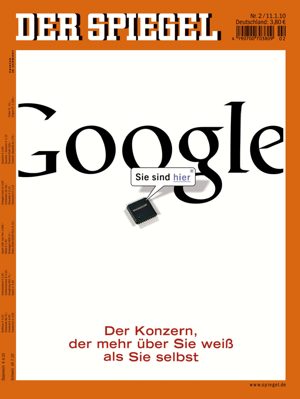Sunday, January 10, 2010
German Spiegel on Google Goggles’ Face Recognition and More
German Spiegel (“mirror”) has a relatively good cover story about Google out for tomorrow’s issue, perhaps more balanced than some of the magazine’s online articles. There’s a broad overview of Google’s recent and older products and what privacy issues they imply; the title suggests that Google now knows more about you than you do yourself... you are now on a computer chip.
Google’s Philipp Schindler in an interview on the other hand tells Spiegel (my translation):
We don’t spy, nor do we sell data to third parties. We are not interested in you as a person. We know neither your name nor your personal data, nor your bank account. You can register as “Donald Duck” and use all personalized services. Only your internet provider has your real name. For our computers you are always anonymous – and you will stay so for our advertisers.
This take is false for me: Google has my name (their form asked for it), they got my bank account (Google Checkout), and certainly they got personal data (like my Gmail emails, which include passwords, or Google Docs texts and spreadsheets). All voluntarily, but saying it ain’t so doesn’t make that data less existing. Or does Google suggest we should lie and register as Donald Duck to protect our privacy?
As with many other mainstream articles, in this one by Spiegel often the lobbyist’s view protecting older business models is the sole one to be seen on an issue... for Google Book search, a “worldwide outrage” over copyright issues is mentioned, though I can’t see any users being quoted saying they’d be happy to have even more books available for searching or reading from even more companies scanning these works (I would like to see that, am I alone?).
One interesting bit about Google Goggles is mentioned. The mobile app Goggles lets you snap a photo of real-world objects to then try to retrieve relevant information about it from the digital world. This works (if it works) for things like monuments, book covers and more. According to the article, one thing which current versions of the software lack is the ability to recognize faces. However:
It’s becoming obvious where this is going: Google is learning to see. The search engine giant uses its image database to recognize objects of the real world.
Soon, this may include the beautiful female stranger who just entered the coffee place. If there happens to be a photo of her in the vast depths of the internet, then there’s a good chance Google has it stored – and everyone taking a photograph of the person in question can now try to identify her.
While faces are especially hard to recognize, engineers are working on it. At the moment, naturally this tracing feature is locked. According to a spokesperson, first problems evolving around privacy need to be looked into.
However it may merely be a matter of time until this technology arrives – if for no other reason then because people will go crazy trying to have it. For better or worse, curiosity about our peers is one of our strongest driving factors.
In the meantime, Tim O’Reilly, an actively involved prophetic thinker of the connected society, already got to see a presentation of “Goggles” with activated face recognition – and was captivated. “That was a glimpse of the future.”
For friends of privacy protection, though, an abyss opens. Every prankster would be enabled to stalk the next best prey (...) We might be facing the end of anomity in public space.
Spiegel mentions the case of one German woman whose nude pictures made it to the internet, and from there around the world. Later someone connected her name to the pictures, and since then, Spiegel says, entering her name in Google revealed the nude pictures on top. With every new business meeting or blossoming new relationship, this freelancer woman was now fearing the other party would look her up on Google. After a while she knew only one solution: to change her name, move to another location, and hope for a new life. Spiegel remarks, “This will end the day a random stranger targets her with his mobile phone with automatic face recognition ... We can change our name, but with our faces, humans are nearly inescapably tied to their old actions.”
No chance for a second start? Spiegel ends the article with a different angle. Some believe that embarrassing things will become less embarrassing once everyone can see everyone else’s faults – the internet as community of the flawed. David Weinberger is quoted: “An age of transparency must be an age of forgiveness.” Or, as Marc van der Chijs puts it in Googlespeak: Life is beta.
>> More posts
Advertisement
This site unofficially covers Google™ and more with some rights reserved. Join our forum!

